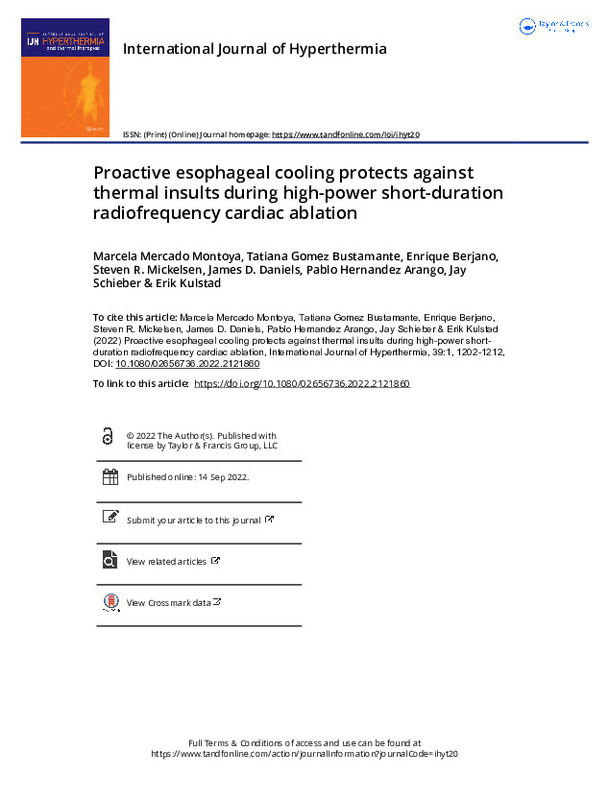JavaScript is disabled for your browser. Some features of this site may not work without it.
Buscar en RiuNet
Listar
Mi cuenta
Estadísticas
Ayuda RiuNet
Admin. UPV
Proactive esophageal cooling protects against thermal insults during high-power short-duration radiofrequency cardiac ablation
Mostrar el registro sencillo del ítem
Ficheros en el ítem
| dc.contributor.author | Mercado Montoya, Marcela
|
es_ES |
| dc.contributor.author | Gomez Bustamante, Tatiana
|
es_ES |
| dc.contributor.author | Berjano, Enrique
|
es_ES |
| dc.contributor.author | Mickelsen, Steven R.
|
es_ES |
| dc.contributor.author | Daniels, James D.
|
es_ES |
| dc.contributor.author | Hernández Arango, Pablo
|
es_ES |
| dc.contributor.author | Schieber, Jay
|
es_ES |
| dc.contributor.author | Kulstad, Erik
|
es_ES |
| dc.date.accessioned | 2022-11-25T19:02:10Z | |
| dc.date.available | 2022-11-25T19:02:10Z | |
| dc.date.issued | 2022-12-31 | es_ES |
| dc.identifier.issn | 0265-6736 | es_ES |
| dc.identifier.uri | http://hdl.handle.net/10251/190208 | |
| dc.description.abstract | [EN] Background Proactive cooling with a novel cooling device has been shown to reduce endoscopically identified thermal injury during radiofrequency (RF) ablation for the treatment of atrial fibrillation using medium power settings. We aimed to evaluate the effects of proactive cooling during high-power short-duration (HPSD) ablation. Methods A computer model accounting for the left atrium (1.5 mm thickness) and esophagus including the active cooling device was created. We used the Arrhenius equation to estimate the esophageal thermal damage during 50 W/ 10 s and 90 W/ 4 s RF ablations. Results With proactive esophageal cooling in place, temperatures in the esophageal tissue were significantly reduced from control conditions without cooling, and the resulting percentage of damage to the esophageal wall was reduced around 50%, restricting damage to the epi-esophageal region and consequently sparing the remainder of the esophageal tissue, including the mucosal surface. Lesions in the atrial wall remained transmural despite cooling, and maximum width barely changed (<0.8 mm). Conclusions Proactive esophageal cooling significantly reduces temperatures and the resulting fraction of damage in the esophagus during HPSD ablation. These findings offer a mechanistic rationale explaining the high degree of safety encountered to date using proactive esophageal cooling, and further underscore the fact that temperature monitoring is inadequate to avoid thermal damage to the esophagus. | es_ES |
| dc.description.sponsorship | Research reported in this publication was supported by the National Heart, Lung, And Blood Institute of the National Institutes of Health under Award Number R44HL158375 (the content is solely the responsibility of the authors and does not necessarily represent the official views of the National Institutes of Health) and by the Spanish Ministerio de Ciencia, Innovacion y Universidades/Agencia Estatal de Investigacion (MCIN/AEI/10.13039/501100011033 under grant RTI2018-094357-B-C21). | es_ES |
| dc.language | Inglés | es_ES |
| dc.publisher | Taylor & Francis | es_ES |
| dc.relation.ispartof | International Journal of Hyperthermia | es_ES |
| dc.rights | Reconocimiento (by) | es_ES |
| dc.subject | Atrial fibrillation | es_ES |
| dc.subject | Radiofrequency ablation | es_ES |
| dc.subject | Atrioesophageal fistula | es_ES |
| dc.subject | Esophageal cooling | es_ES |
| dc.subject | Mathematical modeling | es_ES |
| dc.subject.classification | TECNOLOGIA ELECTRONICA | es_ES |
| dc.title | Proactive esophageal cooling protects against thermal insults during high-power short-duration radiofrequency cardiac ablation | es_ES |
| dc.type | Artículo | es_ES |
| dc.identifier.doi | 10.1080/02656736.2022.2121860 | es_ES |
| dc.relation.projectID | info:eu-repo/grantAgreement/AEI/Plan Estatal de Investigación Científica y Técnica y de Innovación 2017-2020/RTI2018-094357-B-C21/ES/MODELADO Y EXPERIMENTACION PARA TERAPIAS ABLATIVAS INNOVADORAS/ | es_ES |
| dc.relation.projectID | info:eu-repo/grantAgreement/NHLBI//R44HL158375/ | es_ES |
| dc.rights.accessRights | Abierto | es_ES |
| dc.contributor.affiliation | Universitat Politècnica de València. Escuela Técnica Superior de Ingeniería del Diseño - Escola Tècnica Superior d'Enginyeria del Disseny | es_ES |
| dc.description.bibliographicCitation | Mercado Montoya, M.; Gomez Bustamante, T.; Berjano, E.; Mickelsen, SR.; Daniels, JD.; Hernández Arango, P.; Schieber, J.... (2022). Proactive esophageal cooling protects against thermal insults during high-power short-duration radiofrequency cardiac ablation. International Journal of Hyperthermia. 39(1):1202-1212. https://doi.org/10.1080/02656736.2022.2121860 | es_ES |
| dc.description.accrualMethod | S | es_ES |
| dc.relation.publisherversion | https://doi.org/10.1080/02656736.2022.2121860 | es_ES |
| dc.description.upvformatpinicio | 1202 | es_ES |
| dc.description.upvformatpfin | 1212 | es_ES |
| dc.type.version | info:eu-repo/semantics/publishedVersion | es_ES |
| dc.description.volume | 39 | es_ES |
| dc.description.issue | 1 | es_ES |
| dc.identifier.pmid | 36104029 | es_ES |
| dc.relation.pasarela | S\471591 | es_ES |
| dc.contributor.funder | AGENCIA ESTATAL DE INVESTIGACION | es_ES |
| dc.contributor.funder | National Heart, Lung, and Blood Institute, EEUU | es_ES |








